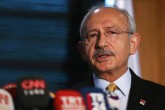The same day the congressional elections took place in the U.S., the State Department announced that it would offer rewards for information leading to the arrest of three major PKK figures, namely Murat Karayılan, Cemil Bayık and Duran Kalkan. It was a belated decision on the U.S.’ part, given the facts that the PKK has been listed as a terror group for years and these high-profile names that have been on Turkey’s most-wanted list for decades, have held leadership positions within the PKK at least since the arrest of Abdullah Öcalan.
Despite the delay, the decision was still welcomed by the Turkish public. There has also been a cautious optimism among political analysts who have commented on the development. However, the consensus is that if the U.S. is willing to fix the broken trust between the two countries, caused by the U.S. support for PKK’s Syrian affiliate, the People’s Protection Units (YPG) – listing these names in the Rewards for Justice Program is only the first step in the right direction.
The U.S. decision to train and equip YPG members in northern Syria has been one of the most destabilizing factors in Turkey-U.S. bilateral relations. Although the alliance experienced crises, the relationship was never as threatened when the U.S. decided to support and arm a group that Turkey considers to be a significant security threat.
The impact of Washington’s shortsighted decision was aggravated by the irresponsible attitudes of U.S. officials. Their pictures with YPG/PKK members, the public glorification of the YPG and stubborn disregard for Turkey’s national security have led to a major crisis in confidence. Moreover, most of these U.S. moves took place when the PKK was still carrying out deadly terrorist attacks across Turkey. These one-sided moves have only negatively impacted Turkey’s public opinion on Washington.
Last week’s decision to put a bounty on the PKK leadership is, of course, a positive step, but if the U.S. wants to end the current crisis in bilateral relations, there are some additional steps that need to be taken.
The Turkish public will be closely watching if there are any actual steps to arrest these individuals. As we saw after the arrest of Abdullah Öcalan, the arrests of the three listed would not mean the end of the terrorist group. Following a major terror campaign that the group launched against Turkey in 2015, Ankara has been extremely committed to taking all the necessary steps to eradicate the organization, not only from its cells in Turkey but also from its safe havens in Iraq and Syria.
The operations in Iraq’s Qandil and Sinjar reaffirmed this decisiveness. The issue of YPG/PKK presence in northern Syria will also continue to be a major irritant.
So far, the Turkish public is not convinced that the U.S. has an exit strategy regarding its relations with the YPG. Washington’s talking point regarding its relationship with the YPG – claiming it is merely tactical, transactional and limited – does not mean a lot at this stage since there are questions that need answers. What will happen to the YPG after the fight against Daesh ends? What territories will be controlled by the YPG? How can the U.S. guarantee that the YPG will not attack any Turkish targets? What will happen to the weapons and ammunition that the U.S. provided to the YPG?
Experts and officials in Washington know that the distinction between the YPG and the PKK is nonexistent. In fact, high-level officials testified in Congress that there were no differences between the two.
Last week, speaking in a conference in Washington, Ambassador James Jeffrey even called the group an “offshoot of the PKK.” Given the critical state of relations between Turkey and the U.S. and given the significance of Turkey in the long-term future of the region – both in terms of stabilization and reconstruction – the U.S. must realize that it needs a rapid exit strategy regarding its cooperation with the YPG. They also must execute this exit strategy with utmost consideration and care for Turkey’s national interests. Without taking these steps, asking the Turkish government to launch talks with a terrorist group will not only be perceived as insensitive to Turkish security concerns but will only further jeopardize the Turkish-American relations.
[Daily Sabah, 17 November 2018]
In this article
- Opinion
- Abdullah Öcalan
- DAESH
- Daily Sabah
- Elections
- Fight against DAESH
- Fight Against Terror
- Iraq
- James Jeffrey
- Kurdistan Workers' Party Terrorist Organization (PKK)
- Middle East
- People's Protection Units (YPG)
- PKK - YPG - SDF - PYD - YPJ - SDG - HBDH - HPG - KCK - PJAK - TAK - YBŞ
- Syria
- Syrian Civil War
- Syrian Conflict
- Syrian Crisis
- Turkish Foreign Policy
- Turkish-American Relations
- Türkiye-US Relations
- Türkiye's Foreign Policy
- United States (US)



